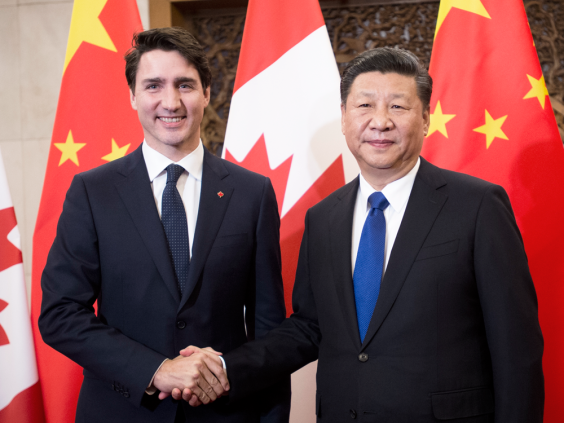Not to have a correct political point of view is like having no soul –Mao Zedong
With Richard Nixon’s official visit to China in 1972, the world took an irreversible turn to the Left.
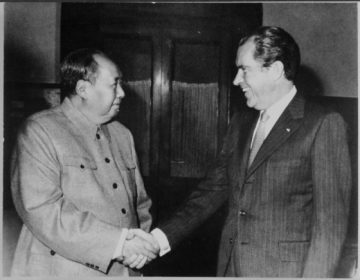 Not only did the seven-day excursion end the 23-year diplomatic isolation of the People’s Republic of China, it marked the first step towards normalizing relations between those two countries and reopening China to the rest of the world.
Not only did the seven-day excursion end the 23-year diplomatic isolation of the People’s Republic of China, it marked the first step towards normalizing relations between those two countries and reopening China to the rest of the world.
What the U.S. president did not anticipate, however, was that his gambit would result in opening the entire world to the Chinese Communist Party which quickly began to insinuate itself ubiquitously, growing and extending its power to the dangerous levels it exerts today after a long and lethal century of persistence. It was a century which began in July 1921 with the founding of the CCP which, by 1949, led to the expulsion of China’s legitimate leader Chiang-Kai-Shek to Taiwan thereby allowing Maoist communism to rule China implacably. Yet today it appears that far too few citizens in western democracies are aware of just what a bloody and benighted history Mao’s totalitarian ambitions have wrought.
“It has grown from little more than a dozen members in 1921 to 90 million, with its own military force of 2 million personnel, and a multitude of organizations trying to control every aspect of Chinese society,” write Clive Hamilton and Mareike Ohlberg in their authoritative new book Hidden Hand, Exposing How the Communist Party is Reshaping the World, which thoroughly exposes CCP methods and how the party really operates. As such, it belongs in the library of every Canadian concerned about his nation’s future.
Canada’s Political Illiteracy
“One of the biggest challenges in dealing with China is precisely this political illiteracy of foreign interlocutors, especially when combined with the proliferation of Party-linked influence organizations that mask their ties,” the authors explain. The result is that the international community has repeatedly failed to understand the dominant role the CCP plays in China where it exerts control over all aspects of life: “To grasp just how much the Party dominates all other institutions, note that the People’s Liberation Army is not a national army, but the armed wing of the CCP.”
Similarly, executives of State-owned enterprises are appointed by the Organization Department of the CCP. And Chinese media are not state-owned, but Party-owned, with the controlling share belonging to the CCP’s propaganda apparatus, fulfilling like never before Mao’s definition of the role of the Party in China: “Government, military, society and schools, north, south, east and west – the Party rules everything.”
This is no over-statement. Indeed, Mao’s dictum has epitomized a century of this Leninist party, founded with the specific purpose of becoming the ‘revolutionary vanguard’ of the Chinese people. As such, the CCP was set up as the central organization, penetrating all sections of Chinese society and placed above all other institutions, including the military and state agencies, the most important of which are the Propaganda Department, the International Liaison Department and the United Front Work Department – all arms of the CCP and utterly totalitarian in their mindset and aims.
How deeply President Nixon understood this – despite his open hatred of communism – can never be known. Nor whether, upon meeting Chairman Mao for an hour that week, he could ever have conceived the consequences of his historic move towards China.
The Spectre of Mao
Nixon was aware, however, as was the rest of the world half a century ago, that Chairman Mao was a genocidal dictator, a fact almost totally ignored today in academia and in media. So when asked ‘Can you name the greatest mass murderer in 20th century?’ students are likely to answer Hitler or Stalin. They’d be wrong. According to the authoritative Black Book of Communism, an estimated 65 million Chinese died as a result of Mao’s pathological attempts to create a new ‘socialist’ China where anyone perceived as an obstacle was eradicated – by execution, imprisonment or forced famine, levels of which reached more than 50 percent in some Chinese villages. Which meant that between 1959 and 1961, the total number of dead reached somewhere between 30 and 40 million, the population of California.
Then, five years later, when he sensed that revolutionary fervor was waning among the Chinese, Mao proclaimed the Cultural Revolution wherein gangs of Red Guards – young men and women between 14 and 21 – roamed the cities targeting revisionists and other enemies of the state – all for the promulgation of Maoism. During which time Catholics and other minorities were persecuted savagely as Mao kept expanding the laogai, a system of 1,000 forced labour camps throughout China where, from the 1950s through the 1980s, an estimated 50 million Chinese passed through that Soviet-style gulag.
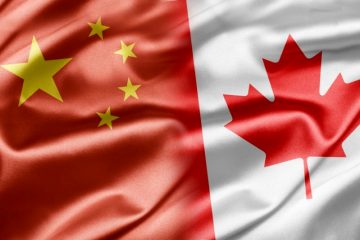 Yet despite all the genocidal horror, Mao Zedong remains the most honoured figure in the Chinese Communist Party and is even emulated by Justin Trudeau who, when asked which nation he admired most, responded: “There’s a level of admiration I actually have for China. Their basic dictatorship is actually allowing them to turn their economy around on a dime.”
Yet despite all the genocidal horror, Mao Zedong remains the most honoured figure in the Chinese Communist Party and is even emulated by Justin Trudeau who, when asked which nation he admired most, responded: “There’s a level of admiration I actually have for China. Their basic dictatorship is actually allowing them to turn their economy around on a dime.”
Trudeau’s revealing remarks were made seven years ago. Today the repression that has been the hallmark of Chinese communism for 70 years continues apace while the rest of the world pretends that China’s vast concentration camps of imprisoned Tibetans and Uighurs are no business of theirs. Nor should this interfere with trading in China’s vast market of companies and investors. Nor do they seem bothered that China has continued its theft of intellectual property through sophisticated cyber attacks which cannot happen without the Chinese government’s initiation or approval.
Pirating Nortel
A case in point was the pirating of Canada`s Nortel Networks Corp., once one of the world’s largest companies. At its height in 2000, the telecom equipment manufacturer employed 90,000 people and had a market value of C$250 billion at the time, accounting for more than 35% of Canada’s benchmark stock market index, the TSE 300. Nortel’s sprawling Ottawa research campus sat at the center of a promising tech ecosystem, and dominated the market for fiber-optic data transmission systems; it had invented a touchscreen wireless device almost a decade before the iPhone and controlled thousands of fiber-optic and wireless patents. And instead of losing its most promising engineers to Silicon Valley, Nortel was attracting brilliant coders from all over the world, making it likely that it would help lay the groundwork for the next generations of wireless networks, which would be known as 4G and 5G.
Yet, according to Bloomberg News, Nortel’s explosive success also made it a target for Chinese hackers, about which more later.
Meanwhile in the richly carpeted boardrooms of Canada`s upper echelons, representatives from the countless CCP front groups were quietly cultivating business people and diplomats into believing their ‘friendship’ with China would help China become more democratic, and more ‘westernized’ in its approach to the world.
It’s a lie, of course, repeated millions of times and to great effect in charming business and diplomatic elites around the world. So much so that this lie has produced countless ‘friends of China’ situated at the levers of power in towns, cities, provinces, states, and nations across the globe. All seduced by sophisticated techniques of behavioural control and manipulation while appearing benign, benevolent and helpful.
John McCallum explained
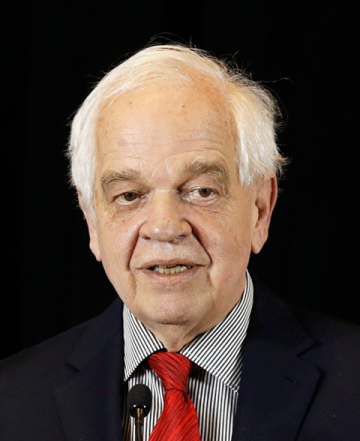 Take, for example, John McCallum, poster child for the effectiveness of CCP techniques of psychological manipulation as applied to excellent effect on a wide range of people in Western countries identified for their value to the Party. “The aim is to draw them into alignment with Beijing’s political objectives, often by convincing them that they have a special relationship with China,” Hamilton and Ohlberg write.
Take, for example, John McCallum, poster child for the effectiveness of CCP techniques of psychological manipulation as applied to excellent effect on a wide range of people in Western countries identified for their value to the Party. “The aim is to draw them into alignment with Beijing’s political objectives, often by convincing them that they have a special relationship with China,” Hamilton and Ohlberg write.
But when Huawei’s chief financial officer, Meng Wanzhou, was arrested for bank fraud in Vancouver in December 2018, on an extradition request from the United States, an angry diplomatic fight ensued – in which Beijing made dire threats to Ottawa rather than Washington, jailing as pawns two Canadian citizens on trumped-up charges. Canada’s ambassador to China, John McCallum, then came quickly to Meng’s rescue by publicly advising her on how she could mount the best legal defence against extradition to the U.S.
Already well known as a friend of China due to his comments that Canada had more in common with China than with the U.S., some suggested the ambassador sounded as if he were speaking for the government of China rather than defending Canada’s position. “All of which goes a long way towards explaining how the ambassador could have fallen victim to the CCP’s psychological techniques,” the authors conclude.
A few days later, McCallum was fired, leaving observers to wonder how such an experienced politician and diplomat could misfire so badly. The answer is easy: as with so many other dupes, McCallum had vainly begun to see himself as entrusted with unusual insight into the inner workings of Chinese politics, as the authors point out.
On a larger scale then, consider how such seduction, however subversive, might have worked to foster Chinese interests in Canada over the past decades.
Add to Hamilton and Ohlberg’s important research the work of Jonathan Manthorpe, a veteran foreign-affairs reporter, whose book, Claws of the Panda: Beijing’s Campaign of Influence and Intimidation in Canada, appeared last year and the picture becomes ever clearer.
Enter Power Corp
As deep background, Manthorpe identifies Paul Demarais’s Power Corp as the portal through which the CCP made its initial, and perhaps most crucial, thrust into Canada via a 1977 conference that brought together what Manthorpe calls ‘Canada’s corporate aristocracy’.
It was then that Power Corp chief Demarais, together with Maurice Strong, Liberal Party member and CEO of Petro-Canada, called for a permanent trade presence in China. This led to the formation of the powerful business lobby, the Canada-China Business Council, which had as a founding member the China International Trust and Investment Corporation (CITIC). This soon grew into a huge business conglomerate with entrée into the most senior levels of Canada’s business elite. In turn, Power Corp channelled most of its China investments through that military-linked company.
It’s no secret the Liberal Party has for many decades been linked to Power Corp which has long been a revolving door for recycling dozens of political advisers, prime ministers, provincial premiers and other political operatives who, at one time or another, have worked for Power Corp in important capacities. These include Jean Chretien, Paul Martin, Brian Mulroney and Pierre Trudeau, the PM’s father.
Yet as two decades passed in the shadows after Nixon’s initiative, some of these backroom dealings were beginning to look a little too incestuous, even questionable. This prompted the Royal Canadian Mounted Police (RCMP) and the Canadian Security Intelligence Service (CSIS) to investigate and then in 1997 to release a critical report. The report stated that ‘a new triumvirate’ had established itself in Canada, an alliance of China’s intelligence agencies, triad gangs, and Chinese tycoons who were buying up local companies: “The three groups were cooperating in operations to steal Canadian technology, acquire influence over the economic levers of the country, and exercise political sway through business associations with powerful politicians.” The report also warned of growing CCP interference in universities, and of Bejing-linked tycoons building political influence through real estate investments. Further, the report noted that the acquisition of Canadian firms was led primarily by CITIC, which was not only embedded in Power Corp but had also become a substantial donor to the main political parties.
Shocking findings, to be sure. But because the Chretien government was said to be more interested in actively pushing closer economic links with China, the report was denounced and buried.
Throughout this period, however, according the Manthorpe, Power Corp was the ‘premier gatekeeper‘ of Canada’s formal relations with China, and the network of elites in Canada. And China was seeing to the election of trusted Chinese-Canadians to political office, including a number in federal parliament. Justin Trudeau was reported to have been visiting the homes of wealthy Chinese-Canadians for private fundraising events as well. So, given all this easy and urbane access, the CCP bosses were convinced they would always get their way in Canada. So much so that when Meng was arrested, they felt betrayed. Which, in turn, led to the swift arrests of two Canadians on bogus charges while Huawei (essentially owned by the CCP and Nortel’s deemed successor) continued its fight for the implementation of its trillion dollar technology across Canada.
Another Shoe Drops
Then, just four months later, another shoe dropped. A parliamentary committee released a report in April 2019 highlighting Beijing’s complex campaigns of subversion, threats, influence-buying, bullying and espionage in Canada. The committee’s official conclusion? China is a threat to Canada’s national security.
“When it comes to defending Canada from the menace posed by the People’s Republic of China, it is now a matter of public record, and should be a matter of some embarrassment to Prime Minister Justin Trudeau, if not shame, that the course his government embarked upon almost four years ago was dangerously naive, if not recklessly thoughtless,” opined 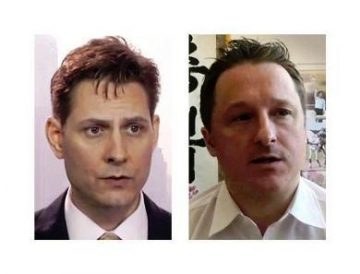 Terry Glavin of The National Post on the parliamentary findings. “It’s a tragedy that it took the Chinese Ministry of State Security’s kidnapping of former Canadian diplomat Michael Kovrig and cultural entrepreneur Michael Spavor to prove that the Beijing regime was not the ‘win-win, golden decade’ friend and trade partner Trudeau had incessantly harped about. Robert Schellenberg, dubiously convicted on drug-smuggling charges in the first place, had his 15-year jail sentence upgraded to a cell on death row. Canada’s canola exporters are stuck with $2.7 billion in export contracts that Beijing has ripped up. Threats of further punishment hang in the air.”
Terry Glavin of The National Post on the parliamentary findings. “It’s a tragedy that it took the Chinese Ministry of State Security’s kidnapping of former Canadian diplomat Michael Kovrig and cultural entrepreneur Michael Spavor to prove that the Beijing regime was not the ‘win-win, golden decade’ friend and trade partner Trudeau had incessantly harped about. Robert Schellenberg, dubiously convicted on drug-smuggling charges in the first place, had his 15-year jail sentence upgraded to a cell on death row. Canada’s canola exporters are stuck with $2.7 billion in export contracts that Beijing has ripped up. Threats of further punishment hang in the air.”
Meng & the 5G Rollout
Why? “It’s all because Canada detained Huawei Technologies Co. Ltd. chief financial officer Meng Wanzhou last December on a U.S. Justice Department extradition warrant,” Glavin continued. “Meng is sought by the U.S. to face charges of fraud and dodging sanctions on Iran.”
Glavin also confirmed that Beijing’s complex campaigns of subversion, threats, influence-buying and espionage in Canada stretch back much farther than Meng’s arrest. As does the sleazy tendency of Canadian politicians to look the other way, and throw the director of the Canadian Security and Intelligence Service under the bus for inconveniently pointing out these ugly facts.
He was referring to CSIS director Richard Fadden who had the temerity to point out nearly a decade earlier that there were provincial cabinet ministers and other elected officials in Canada who had fallen under Beijing’s general influence, prompting several Liberal and NDP MPs to demand Fadden’s resignation.
“So it was refreshing to see that (this) first-ever annual report from the National Security and Intelligence Committee of Parliamentarians (NSICOP) made no bones about it,” Glavin concluded. “China is a threat to Canada’s national security, the committee found. Terrorism, espionage and foreign influence, cyber threats, major organized crime and weapons of mass destruction were all listed in the NSICOP report among the top threats to Canada. China figures in the report’s findings under espionage and foreign influence, and under cyber threats as well.”
Refreshing too because, as Glavin pointed out: “Usually, Ottawa lets China get away with anything. China is known globally for its efforts to influence Chinese communities and the politics of other countries. The Chinese government has a number of official organizations that try to influence Chinese communities and politicians to adopt pro-China positions, most prominently the United Front Work Department,” the report states, referring directly to Fadden’s whistleblowing in 2010.”
Disparate Pressures Mount
Add to this a 2018 report by Amnesty International to CSIS which included an exhaustive account of Beijing’s intensive campaign of threats and harassment targeting Canadian diaspora organizations devoted to Chinese democracy, the Falun Gong spiritual movement, Tibetan sovereignty, and the Uighurs currently being subjected to an overwhelming tyranny of concentration camps and religious persecution and it becomes ever clearer that, as Manthorpe concludes: “Canada has become a battleground on which the Chinese Communist Party seeks to terrorize, humiliate and neuter its opponents.”
In addition, Confucius Institutes have operated openly in dozens of Canadian universities, colleges and high schools for years. “In most cases,” Manthorpe contends, “they are espionage outstations for Chinese embassies and consulates through which they control Chinese students, gather information on perceived enemies and intimidate dissidents.”
The Nortel Heist
All hiding in plain sight. Just as happened in the case of Nortel which, it now emerges, was nothing short of a Chinese military attack, first sensed by Nortel cyber-security advisor Brian Shields who, in 2004, was investigating a serious breach in the telecom giant’s network. At the time Nortel’s fibre optics equipment was the world’s envy, with 70 percent of all internet traffic running on Canadian technology.
According to a Global News report last month detailing the heist, Shields found that a computer in Shanghai had hacked into the email account of an Ottawa-based Nortel executive. He also found the hacker controlled the accounts of at least seven Nortel executives, confirming that this was no random cybercriminal. And though Shields tracked the hackers for months, Nortel’s brass was mostly disinterested in the investigation and so did little more than change executive account passwords, Shields says.
So the systematic hacking continued, and as a result, in 2009 – after getting massively underbid on a series of contracts by China’s state-champion company Huawei – Nortel went bankrupt after China’s government had already gained complete control of Nortel’s internal systems.
Nor was it a coincidence, Shields believes, that upstart Huawei suddenly replaced Nortel as the world’s dominant internet technology provider. “Canadians just don’t realize the extent of the Chinese government’s involvement in this thing.”
Oblivious to the Threat
Today, more than 20 years after Nortel was first warned of Chinese Communist Party espionage, Hong Kong Canadians such as Cherie Wong say that Ottawa’s failure to protect Nortel and to promptly bar Huawei from modern 5G networks is putting lives at risk.
Wong, executive-director of Alliance Canada Hong Kong, an umbrella group for democracy advocates, says Chinese dissident groups are already tracked and targeted by the Chinese Communist Party in Canada, through Chinese social media apps like WeChat and TikTok. And the threat of Huawei 5G Internet in Canada is much worse, she says. “We are being threatened and harassed. So giving Huawei control of the internet means everything we do will be monitored and tracked and given to the Chinese state.”
Yet this government in particular and the media in general seem oblivious to the Chinese communist threat to Canada. Oblivious to the fact that mere hours after landing in Beijing in August 2016, Justin Trudeau signalled that Canada was ready to apply for membership in the Asian Infrastructure Investment Bank, a China-led institution the United States has refused to join.
“Canada is in a position to help China position itself in a very positive way on the world stage,“ Trudeau said at the time, calling the move a ‘reset’ and pitching Canada as a bridge between China and the world, a political role fashioned by his father.
Chinese Bankers – Do They Have a Role?
Trudeau followed up the deal in October 2017 with massive budget bill C-63 which gave his government the authority to give hundreds of millions in taxpayer dollars to the China-led Asian Infrastructure Bank (seen as China’s counterweight to the U.S.-led World Bank and Japan’s Asian Development Bank) and giving the finance minister authority to transfer $480 million in taxpayer dollars from Canada to the AIIB. Which meant the government was laying the ground work to give even more to China, with no obvious benefit to Canada as AIIB does not fund infrastructure in Canada, despite its being part of China’s One Belt One Road policy of expanding its international influence through infrastructure.
So, instead of deepening our ties with allied democratic nations, the Trudeau government has been giving our taxpayer dollars to a bank controlled by a potential geopolitical adversary. Nor, apparently, are there any plans to take back Canada’s millions, despite the kidnapping of the two Michaels. And despite our exports being blocked under false pretenses.
Nor do the government and the media seem bothered by the discovery in June of a possible conflict of interest by their Foreign Affairs Minister Francois-Philippe Champagne who has been holding two mortgages with the Bank of China (UK) Ltd, possibly compromising his ability to handle Canada’s tense relations with the People’s Republic.
Or that, according to Rebel News, John McCallum has just solidified his business connections in the communist dictatorship by working for the Wailian Group, a company that specializes in securing Chinese oligarchs’ children access to citizenship and study in western countries. This could be problematic because, technically, there’s a five year moratorium on lobbying after leaving cabinet.
But no worries because since Trudeau prorogued Parliament to avoid being investigated by the Official Opposition over the WE Scandal, this also means any investigation into McCallum’s conduct is now impossible.
Rising Stench of Corruption
Yet as all these scandals multiply, there is no relief in sight from a Liberal government which appears determined to make no objection to CCP insults – including China’s supplying worthless PPE in response to the government’s sending tonnes of its PPE to China in the early days of the Wuhan virus outbreak which has forced international lockdowns and still threatens economic devastation.
Is this lack of nerve the result of a gradual process of Canada’s business and political elites forming a deep set of entanglements financial, political, and personal friendships with Chinese Communist Party officials?
“That big network of influence – because after all it was really a way in which the CCP was systematically setting out to build these relationships as a way of exerting political influence –has really had a crippling effect on Canada’s understanding and response to China in recent years,” says Hamilton. This, in turn, has led to a total avoidance of any provocation of the CCP.
In the end, none of the above points to an optimistic result. And given what’s been revealed in recent months about the true nature of the CCP’s relationship with Canada, this nation’s future looks even grimmer.
All this information – much of it the result of painstaking personal research rather than media attentiveness – suggests that Canada has been subverted by the Chinese Communist Party to a far greater extent than most Canadians can begin to understand. It also raises many more questions.
Of which I have only two. Given the vast amounts of money handed out by Trudeau’s scandal-ridden Liberals both before and since the Wuhan pandemic, is it impertinent or naïve to ask if – and if so how much – of these unaccounted-for billions might be on loan from the Bank of China? Secondly, now between a rock and a hard place over Meng Wanzhou, will Trudeau roll out Huawei`s 5G in Canada anyway, thereby pleasing China while making Canada a distrusted pariah routinely avoided internationally?

